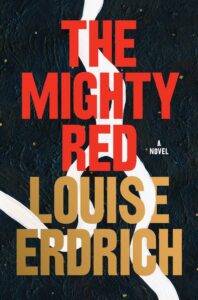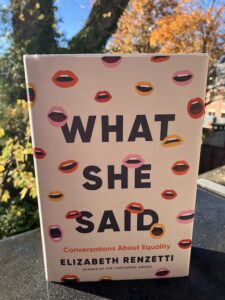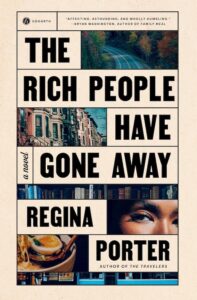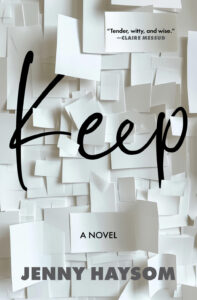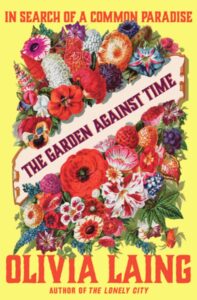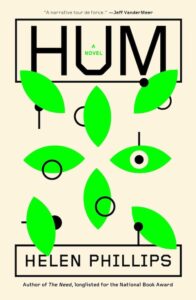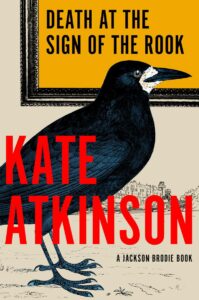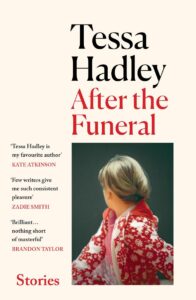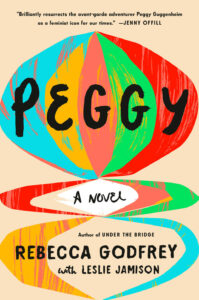February 5, 2025
It Must Be Beautiful to Be Finished, by Kate Gies
Before her second surgery at age five (there would be 14 surgeries in total), Kate Gies had learned to somersault, somersaulting becoming her preferred mode of transport at home: “Bend, tuck head to chest, pull forward, and roll! Like a wheel!” But after the surgery—during which a plastic ear was inserted under grafted skin; Gies was born without a right ear and this replacement would be cosmetic only—she would experience pain from motion as simple as moving her head to one side in her sleep, so there would be no more somersaults. The plastic ear wouldn’t take either, and doctors’ further attempts to deliver on promises of building her ear would be far from straightforward, until finally—at age 14—Gies put a stop to all of it, deciding she preferred living in her body as it was, rather than trying to have two ears, rather than trying to be what she calls, “The Kate I’m Supposed to Be.”
Although that is not the end of the story, the trajectory not so simple, not least of all because Gies is hearing impaired (she has no hearing where she has no ear [obviously!], and her hearing on the other side was compromised following a punctured eardrum from one of many surgeries gone wrong), but spends the next 20 years not considering her disability and the need for accommodation. Instead, “[m]y problem had always been perceived as the physical deformity of the missing ear. Its form was the problem, not its function: what I looked like, not the ease with which I took in an navigated the world.”
The catalyst for Gies’ memoir, IT MUST BE BEAUTIFUL TO BE FINISHED, is the discovery of a lesion on her right earlobe, the earlobe constructed from tissue from her stomach during those childhood surgeries, the ear that she never thinks about, doesn’t touch, disassociated from this part of her body, and still traumatized from the brutal medical procedures she’d suffered during the years doctors spent trying to make her complete. The memoir documents her movement toward finally the facing the reality of her body and of her history full, a journey told in vignettes and fragments from the past.
The fragmented structure of the memoir is emotionally helpful for the reader, because reading it is such a visceral and wrenching experience, and the story in pieces makes that easier. It’s also how memory works, flashes and splinters, and Gies’s memoir is a fascinating exercise in reconstructing history too, the writing including excerpts from her medical records and also feedback from Gies’s mother upon hearing what she’d written, offering corrections and extra insight, her own pivotal point of view. (Gies recalls her mother being extra cheerful before her surgeries at The Hospital for Sick Children in Toronto; her mother tells her how once Gies had been delivered to surgery, she’d have to find a place to cry.)
In addition to Gies herself, who appears to have been born with her somersaulting spirit fully formed, her mother emerges as the hero of this book, standing up for her daughter within a system that offered them very little agency, setting the kind of example that likely empowered Gies to eventually declare herself finished with surgeries—a decision her mother never questioned. Their back-and-forths are one of the most moving parts of this book, her mother’s honest self-criticism, Gies’ generosity in imagining herself into her mother’s perspective in the most stunning and powerful fashion. (I think it was because I was able to relate so strongly to both characters that I found reading this book so incredibly moving, in a way that was sometimes painful, but also a gorgeous testament to what writing can do.)
In telling the story of her own experience in an ableist and misogynist medical system, Gies illuminates broader truths about what it means to have a body, to live with difference, and learn to finally feel at home within one’s skin. I loved this book so much.
December 5, 2024
The Mighty Red, by Louise Erdrich
I loved THE MIGHTY RED so much, one of those books I managed squeeze in before the calendar year is out, and I’m so glad I did, because it’s easily one of the most wonderful novels I’ve read in 2024. Like the river of its title—which originates in Minnesota and North Dakota, and flows north through Manitoba (where I’ve visited it in Winnipeg!), ultimately to Hudson’s Bay—this novel holds vast amounts of geological time, and history, and sediment, and strangeness, and ghosts, and kindness, and cruelty, and it flows and flows and flows. It begins with Crystal Frechette, who works the nightshift hauling sugarbeets and listening to talk radio, worrying about her daughter, Kismet, and perhaps she should be, because Kismet (who’s just finished high school) has found herself within the sights of Gary Geist, high school jock who’s still not over a recent local terrible tragedy that nobody ever talks about. Even though Kismet is sleeping with nerdy Hugo, Gary proves to be somehow irresistible and the two are married, which feels as wrong to Kismet as it should, but everything has been wrong for her family since her father absconded with the church renovation fund and her mother realized she’s on the verge of losing her house to a very dodgy mortgage. Light, quirky and breezy in places, The Mighty Red is also weighted with substance at the very same time, a story of the land, and the connections to it by Crystal and Kismet, who are Indigenous (Erdrich is a member of the Turtle Mountain Band of Chippewa), Gary’s mother whose family’s farm was lost a generation ago, farmers who are working on an industrial scale and seeing their soil being ruined by Round-Up, other farmers trying natural methods of controlling pests and organic farming, the whole story feeling a little bit Barbara Kingsolver, and I mean that in the best possible way. This is a story about love, and family, and books and reading, and gardens and weeding, and the 2008 economic crisis, which is also the story of how we got to 2024, and it’s really about everything, like the river at its heart. Awesome and eternal.
November 13, 2024
What She Said, by Elizabeth Renzetti
I can’t find an archived copy anywhere, but I swear I listened to Gloria Steinem about ten years ago in conversation with a supposedly feminist male radio host who would very soon after be exposed as a sexual predator, and what she was telling him was that when she’d first learned about patriarchy and sexual inequality decades earlier, she’d decided that there was nothing more urgent than letting other people, the people with power, know about it. Because once they knew, she thought, surely they would want to change things, to make the world more fair for women and girls. But then eventually, she explains, she realized that it wasn’t that these people didn’t know, it was that they didn’t care, and that whole lives, careers, industries, cultural identities were actually tied up in patriarchal systems and structures which were so much more deeply entrenched than she’d ever understood, and ten years ago I thought I knew what Gloria Steinem was talking about, but I had actually had no idea. The feminist backlash roller coaster ever since then is the very worst ride I’ve ever been on.
It’s a mindfuck that my excellent friend Elizabeth Renzetti has been documenting throughout her journalism career, including with her first essay collection, SHREWED. And now her follow-up, WHAT SHE SAID, six years later, finds readers at a moment, post pussy-hat, that is somehow even worse, in which we keep being told not to believe the evidence before our very eyes—that Kamala Harris was “unqualified,” for instance. That abortion bans are about anything more than controlling women’s bodies. That our men and boys are hurting, and we need to be thinking about their feelings, instead of having a societal conversation about the reasons for domestic violence rates being sky high.
It makes no sense, but the gift of WHAT SHE SAID is that Renzetti connects the dots enough that it almost does, and the reader can breathe a sigh of relief: it’s not just you, and it’s not just me, it’s the patriarchy (and it’s all around the world). Renzetti writes about sexual harassment and the reasons women don’t report; about gender inequality in the caring professions, which mean our most vulnerable suffer; about the disparities in women’s health, and how the politics of oppression are inextricably linked to the politics of reproduction; about who tells the stories in Hollywood; about the fraught relationship so many women have with money (and their entitlement to earn it); about whether women have a sell-by date; why it’s so hard for women leaders to be elected in politics; about the incredible abuse hurled at women in journalism; about the links between domestic abuse and terrorism; and about how the world is not designed for us (and the bros who are charged with engineering the future don’t see any problem with this status quo. And then finally (SPOILER ALERT), in her epilogue, Renzetti comes out as a Swiftie: “She bestrides the world like a tall, multi-instrumental, cat loving colossus… She is Taylor Swift, and there’s no one like her.” (If you’re a Toronto Star subscriber, you can read this beautiful, empowering essay online right now. I actually cut out the two page spread from Saturday’s paper, and I’m going to save it forever…)
She is Elizabeth Renzetti, and there is no one like her either, as brilliant (I promise you) as she is funny (and she is so very funny—that this book of brutal things can be filled with lines that made me LOL is really something). Medium height, but a cat lover too, and when this world enough to make your head start spinning, her book will help you realize that you’re not crazy and messed up, it’s just that the world is, but we are not alone in it.
October 18, 2024
The Rich People Have Gone Away, by Regina Porter
I had no idea what I was getting into when I started reading THE RICH PEOPLE HAVE GONE AWAY, a Covid-era novel by Regina Porter, a book that came to my attention via Maris Kreizman’s wonderful substack. A novel whose first section begins with an encyclopedia definition of “door”: “barrier of wood, stone, metal, glass, paper, leaves, or a combination of materials, installed to swing, fold, slide, or roll in order to close an opening to a room or building,” the novel’s following two sections beginning with similar definitions of “doorframe” and “threshold.” And Porter’s doorway/opening to the novel itself, (which is to say, her book’s first paragraph): “Mr. Harper takes sex in doorways. Halts new lovers at the threshold of his front door. Left hand on shoulder. Right hand on hip. He searches the ninth-floor hallway for furtive eyes before pressing the whole of himself in the tender nook of his lover’s ass.” I mean, what now?
Nothing is what it seems in THE RICH PEOPLE HAVE GONE AWAY, set in March 2020 as the world has shut down, neither Mr. Harper himself, who is Theo, presumed suspicious when his young pregnant (white) wife Darla (a bassoonist) disappears on a hike near their cottage in upstate New York, nor the teen in the Cardi B t-shirt who seems to be loitering in Theo’s Park Slope building, nor Darla herself with her secret skills in hotwiring vehicles, or her father, who perished on 9/11. Porter is also an award-winning playwright, and the novel’s playful heteroglossia has those skills on display, resulting in a dynamic and shapeshifting text, full of tricks but never cheap ones, missing white lady/GONE GIRL tropes turned inside out and on their noses, and it’s all so interesting. The narrative moving swiftly through that strange and harrowing season (the teen in the Cardi B shirt’s mother is hospitalized with Covid; she comes off her ventilator; she goes back on her ventilator…) to late spring, late May, the teen boy’s phone blowing up, Minneaopolis, another threshold. “Did you see it?” No resolution. A story without end, but that is also what makes the novel particularly satisfying.
October 16, 2024
Keep, by Jenny Haysom
I’ve been reading all over the place lately, out of necessity, sometimes seven books at at time, bits and pieces, and so it was quite delightful to fall into a novel for the first time in a long time, to read the whole thing in a day. I loved KEEP, by Jenny Haysom, a novel following her award-winning debut poetry collection DIVIDING THE WAYSIDE. KEEP is the story of two real estate stagers charged with packing up the life of Harriet, an elderly poet with dementia, who become entangled in the mess of her life. Although their own lives are not so tidy either—Jacob, in his early 20s, has just been dumped by the boyfriend he moved to Ottawa to be with, having tried and failed to conjure domestic bliss for them; Eleanor, 20-some years older, is dissatisfied with her own domestic arrangement, the small home she shares with her husband and three children altogether too confining, everybody relying on her labour to make it work, and she’s exhausting. KEEP is a novel about building home, about keeping house, about what life does to everybody’s best intentions, and the distance between the faces we present to the world and the realities we’re actually facing. The braided narrative is so well balanced, each character a vivid and engaging presence in the novel, and it’s interesting (and refreshing!) to encounter a book presenting three different generations together and the genuine connections between them.
October 7, 2024
The Garden Against Time, by Olivia Laing
“How strange time is. The same patterns keep recurring, a helical sequence of war and sickness, from out of which emerged the same green-veined dream.”
For a book that’s about her own backyard, Olivia Laing’s THE GARDEN AGAINST TIME: IN SEARCH OF A COMMON PARADISE takes her reader everywhere and back through time as she tells the story of her restoration of an 18th century walled garden begun when she and her partner move to Suffolk in 2020, a year that becomes “that year.” As she moves through her own plague seasons, she draws connections to gardens in the minds of Milton (PARADISE LOST) and rural poet John Clare, changes and trends in English landscaping ( a word that, she tells us, began with art and paintings), of how the mid-Atlantic slave-trade was the foundation of so much wealth that shaped the English landscape (I am also reading Tanya Talaga’s THE KNOWING, from which I learn that those very same investors were reaping the rewards of the North American fur trades that would decimate the continent’s Indigenous peoples), and how gardens have also been at the forefront of movements committed to imagining better ways of organizing society, which seems especially pressing to consider in the sweltering summer of 2022 as parts of the UK burned and watering her garden, Laing thought, seemed like an irresponsible indulgence. And how new life took root in the brutal bomb sites of London after the Blitz, so many of these sites turned into parks, and she casts her mind too back to Mark Rumary, the famed UK garden designer who’d once owned her home (and lived with his partner back when, a neighbour tells her, “it wasn’t good to be gay”) and whose vision is everywhere in the garden still, Laing reflecting on her own childhood growing up with a gay parent in the 1980s, and what the garden must have meant to both of them as place of freedom and belonging. And there’s so much more than that, every single page bringing fascinating rewards and gorgeous insight, doses of hard reality coupled with vision and hope. The garden is never simply this or that, instead the garden is a place for both, and, and for the remarkable persistence of living things (gardeners among them).
September 24, 2024
HUM, by Helen Phillips
In Helen Phillips’ HUM, as with her previous novel THE NEED, the most unsettling parts of the narrative are those that are most familiar, and I don’t even mean the post-apocalyptic backdrop that certainly draws on the possibilities of our present (the forests have burned, May’s children have never seen strawberries growing on a plant, unhealthy air quality is a baseline, the heat is unrelenting, and society is structured on a network of AI systems called “hums”), but instead the anxiety underlying every sentence, an echo of the title. This is not so much a plot or character-based novel as a vibes-based novel, and the vibes are bad. Desperate for money after losing her job, AI developer May agrees to undergo a slight facial modification procedure that she believes is part of a counter-surveillance movement in a society where everything is tracked, and with the payout she splurges for tickets for her family to three days at The Botanical Gardens, a Disney-esque simulation of the natural world she so longs for: “She had done it. She had borne them to a clean green place.” May leaves her phone behind when they leave home, and makes her husband and children do the same (the children, like all children, wear gadgets on their wrist called “bunnies”), and May dares to suppose her family might have a reprieve from the relentless tracking and advertising from the devices they’re all attached to, but she comes to regret her choice when things go wrong and there is a chance her children might be lost to her. None of this description really doing justice to what’s going on here, to the force that drives the story forward, to the accelerated beat-beat-beat of May’s anxious heart as she struggles to hold her family, her marriage, her whole world together. Any parent who has ever considered picking up Jonathan Haidt’s THE ANXIOUS GENERATION will see themselves in May, and while all this might not sound so appealing (who really wants a mirror-image of their most stressed-out self?), Phillips’ taut narrative reads up fast and is utterly gripping, and is rooted in that part of the maternal experience that’s even more essential than worry, and that is love.
September 10, 2024
DEATH AT THE SIGN OF A ROOK, by Kate Atkinson
I didn’t know I liked detective fiction until I read Case Histories in 2005 (apparently purchased with a gift token I got for my 26th birthday!), following up my introduction to Kate Atkinson with her stunning, award-winning debut Behind the Scenes at the Museum, but I have been devoted to Jackson Brodie ever since, and the book turned me on to the genre in general, a genre of which Atkinson is very aware in this latest Brodie instalment, Death at the Sign of the Rook. And it’s true that self-aware detective fiction is having a moment. Maybe it’s not a golden age, exactly, but I’m thinking about Knives Out and Glass Onion, and Richard Osman novels, Only Murder in the Building. Death at the Sign of the Rook begins with a murder mystery weekend at a great house, Brodie himself turning up (there has been a snowstorm and he’s stranded) along with the team of actors playing the parts, and can you imagine what it would be like to run a murder mystery with Jackson Brodie in the room? Atkinson has talked about writing this book in lockdown and her desire to have some fun with the experience, which makes this a lighter Jackson Brodie than we’ve encountered for a while. What leads to the great house begins with a series of art thefts in Northern England, Ilkley, specifically, which is one of my favourite English towns (and which I only visited in the first place because I’d read about Betty’s in a Jackson Brodie novel, and Ilkley is the closest Betty’s location to where my UK family lives. And on my first visit there, I learned about Ilkley’s wonderful Grove Bookshop, which shows up in the novel twice!). Private Detective Jackson Brodie takes the case, and it overlaps with another case in which his protege Reggie Chase has worked, both cases also linked by vintage detective novels left at the scenes by a Agatha Christie-esque author called Nancy Styles. There’s a wacky family of aristocrats (as well as a reference to eccentric Englishmen not being as great as they seem, and Hugh Grant having a lot to answer for), a mysterious elder-carer (with a big bag), a vicar who has lost his faith and his voice, two sets of twins, a former soldier with PTSD and a prosthetic limb, and a murderer on the loose. And like everything Atkinson writes, the scale and pace are Shakespearean, references range from classical to contemporary, everything is just a little absurd, everyone so achingly human. I loved it.
September 3, 2024
AFTER THE FUNERAL, by Tessa Hadley
I’ve never read a Tessa Hadley short story before, just her novels (most recently, Modern Love, and mercifully I still have most of her backlist before me [though they’re not easy to come by—perhaps some of them were never published in Canada?], so I was excited about her new release After the Funeral because it was a Tessa Hadley book at all, and not necessarily because it was a story collection. And then I started reading it and then spent two days walking around exclaiming, “OMG THIS BOOK THIS BOOK THIS BOOK!” because this Tessa Hadley story collection is basically 12 Tessa Hadley novels in one, each story with a ballast that is decades of history and so much perfect detail, and possibly the mind was not meant to handle so much literary goodness in a single sitting or two, because it was seriously overwhelming (and possibly I’m hormonal), but also seriously wonderful, these stories so rich and satisfying, where so much happens, where so much and said and goes unsaid.
These are stories about departures and arrivals, and also odd little intersections that occur somewhere between the two. In a recent New York Times Review of another book, Dwight Garner cited a quotation by John Edgar Wideman, who’d written, “You don’t have to be very smart to write a review of a book of short stories… All you need to say is that some stories in the book are better than others,” but I can’t even say that about this book, because they’re all wonderful. The title story is about what happens to a family after the death of a father, about how long “after the funeral” really can be. In “Dido’s Lament,” Lynette encounters her ex-husband, and reads everything all wrong. “The Bunty Club” is about three sisters, now adult, coming together upon the imminent death of their mother. “My Mother’s Wedding” features the first of a few children in this collection raised by less-than-benign neglect, and the second appears in “Funny Little Snake,” in which a woman encounters her not-so-lovable stepdaughter for the first time and then her even less charming mother. Two adult sisters meet after years of estrangement and pretend not to know each other in “Men.” “Cecelia Awakened” is about a teenage girl on holiday with her parents who finally discerns her separateness from her family, and her family’s separateness from everything else, with gut-punchingly relatable lines like, “Those girls at the next table were silly, but they were worldly, she thought, trying out that world. They were in the world and she and her parents were somehow shut out of it.” In “Old Friends,” a tragedy could possible bring together a couple together, but it turns out the absence of the third in their triangle over pulls them apart. A dream of childhood is still as vivid to a grown man as the present moment in “Children at Chess.” “The Other One” is an epic in under 30 pages, the story of a woman who encounters a figure from her father’s past in an entirely different context. “Mia” is a portrayal of glamour from a teenager’s point of view and finally “Coda,” a lockdown story of loneliness, loss and longing for connection.
Singular, vivid and compelling, every last one of them. This book came out ages ago in the US and UK and I’m glad to finally get a chance to read it. It’s one of my favourite books of the year.
August 28, 2024
Peggy, by Rebecca Godfrey, with Leslie Jamison
The two stories behind Rebecca Godfrey’s novel Peggy are interesting, first the biography of Peggy Guggenheim herself, the iconic art collector from a famous American family, and then Godfrey’s own experience working to complete her novel about Guggenheim before her death from cancer in 2022 and how, when she was unable to do this, her friend Leslie Jamison stepped in to finish the book. But as a reader who knows almost nothing about Peggy Guggenheim and who hasn’t read Godfrey’s work widely (I think I read Under the Bridge a long time ago), neither back story seemed necessarily resonant or pressing to me. Would Peggy be a book I really needed to to pick up?
But then I did, and I couldn’t stop reading.
And I finally understood the weight of Jamison’s task, and what a loss it would have been if this novel had never seen the light of day, because it’s just wonderful, imbued with a kind of magic, rich and artful, the prose full of light and surprises, Peggy Guggenheim so entirely alive on the page. We meet her at the beginning of Chapter 1, “Striped and shot, the tiger lay flat, and I stretched my hungry body across him. He was part treasure, part prey. Though we had so much, I often ignored the chaises and satin chairs, instead gathering my book and lying upon this tattered dead animal.” And it pretty much goes on like that, both extraordinary and so matter-of-fact, Guggenheim’s remarkable experiences including her provenance (“I am the daughter of two dynasties”), that her father went down with the Titanic, her life in 1920s’ Paris, being photographed by May Ray, a love affair with Samuel Beckett, that she was a patron of artists including Djuna Barnes and Emma Goldman, and would build a modern art collection that would become famous throughout the world.
A tragic figure in some ways, Godfrey also shows that Peggy Guggenheim was full of life and spirit, that she would eventually come into her own power, but some losses would never be overcome, and that she was a marvellously imperfect person, beyond ordinary (which is what she so longed to be) but also so achingly human, and that vitality is this novel’s chief appeal, that fiction can seem so real . Even fiction that’s messy and sometimes strange, mistakes and inconsistencies popping up throughout, not overwhelmingly but you notice. At the beginning we learn that Peggy and her sisters were living at the Waldorf-Astoria, but it’s the St. Regis on the following page (and in actuality, according to my internet sleuthing), and initially I was thrown by this—Jamison opted to leave most of Godfrey’s manuscript untouched, to not presume to edit, which seems like a strange call until you come to the line where Peggy is using her eye and describing some Impressionist works to her father: “These paintings look unfinished, but they’re deliberately haphazard.” And then her father points to the paintings and tells her that “all [she] need[s] to know…is that this is life.”
Peggy Guggenheim made art her life, and her life was art, and so too is this strange, beautiful and heartrending novel. Peggy is such a remarkable literary achievement.

